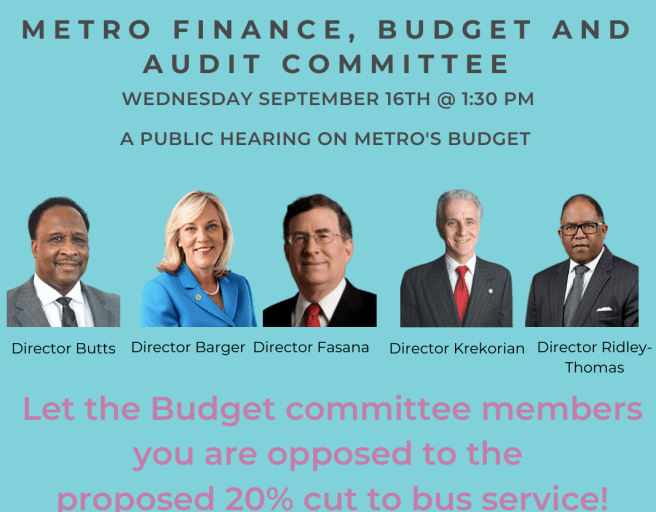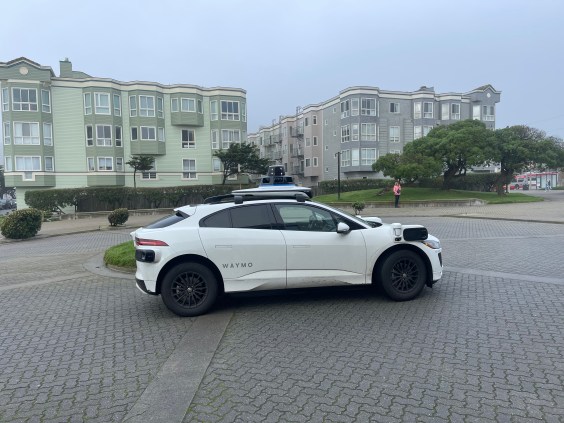Panfila Rodriguez lives in Boyle Heights and works at a restaurant in West Hollywood. For almost 30 years, she has taken Metro buses to get to work, and states that during the last month buses are "más llenos" (more full) and that some riders are not wearing face coverings. She also laments that bus frequency has worsened, with buses that used to arrive every 15-20 minutes now coming every half-hour, forcing her to leave home earlier to get to work on time.
Crowded buses expose more riders like Rodriguez to COVID-19 (as well as exposing Metro bus operators.) When the COVID-19 pandemic hit earlier this year, Metro made serious cuts to transit service. These temporary cuts could now become permanent, even as more riders are returning to the system.
Under a new proposed budget, Metro could approve a 20 percent cut to bus service. Metro is hosting a hearing today at 1:30 p.m. on the 20 percent bus cuts. The final budget vote is expected to take place at the full board meeting on Thursday, September 24.
The cuts were discussed at last month's Metro board meeting. Transit rider advocacy groups - led by the Alliance for Community Transit (ACT-LA) and Investing in Place - rallied riders to oppose service cuts. Public comment included many transit riders who were opposed to the Metro budget service cuts.
During last month's discussion, L.A. City Councilmember and Metro Boardmember Mike Bonin called the proposed budget "sobering and alarming," stressing that it would impact essential workers, low income [riders], people of color. Bonin called the budget a last resort that “kills ridership.” Directors Hilda Solis and Jacqueline Dupont-Walker also expressed concerns, calling for more information on ridership.
Metro's CEO Phil Washington responded that the budget was "dictated by prudent financial management." Washington asserted that Metro would be flexible, and could adjust the budget and service levels.
At the wrap-up of that discussion, L.A. Mayor and Metro board Chair Eric Garcetti termed the cuts as a mere “communications challenge.”
Metro has stepped up its communications strategy to deal with the communications challenge. For the past week, where advocates have tweeted about Metro's 20 percent cuts, Metro has responded that "the budget [does] not cut service further." The Metro tweets are filled with the same gaslighting talking points and statistics (debunked by Investing in Place), distracting from the budget numbers which clearly show a 20 percent service reduction from the prior fiscal year to the current fiscal year.
The current gaslighting extends Metro's misdirection campaign launched last month.
At the August meeting where the board discussed the 20 percent cut, Washington announced that Metro was about to study the implementation of free fares. The free fare announcement got a lot of media attention; the 20 percent service cuts not so much.
When advocates questioned Metro's commitment to funding its roll-out of the NextGen bus service reorganization, Metro staff pointed to pointed to $120 million in mostly marginally-related-to-buses improvements, only $0.6 million of which was actually NextGen. Soon thereafter, Metro’s The Source sang that same “we are continuing to invest in our bus system” hymn.
According to Metro's ridership numbers, after the COVID-19 low in April, transit ridership has gradually increased. This is true even for the month of August, when service remained flat at inadequate infrequent levels. If ridership continues to trend upward as it has, and the Metro budget freezes service at the 20 percent cut level, the result is very likely to be increasingly overcrowded buses - an undesirable situation at any time, but an especially dangerous one during the COVID-19 pandemic.
ACT-LA Director Laura Raymond points to the results of her organization's survey of L.A. residents who her coalition members work with. 314 people responded to survey, conducted in May and June, which found:
- 48.8 percent of respondents had relied on buses before the pandemic and 26.9 percent still had no access to a car.
- The top concern with transit was that buses and trains were not running as regularly. (The other two top concerns were that riders would get sick from buses/trains that weren't cleaned enough and that social distancing isn't being enforced.)
- Numerous respondents expressed the concern that people would feel more safe taking transit if passengers sat at least six feet apart.
Hollywood resident Felipe García works as a janitor and has ridden Metro for 25 years. García expressed that, for the past couple years, "el servicio ha sido pésimo" (service has been abysmal), with buses frequently failing to show up at the scheduled time. "Mi deseo es que en vez de recortar líneas, estas sean más y pasen con más frecuencia," wrote García, "Necesitamos MÁS rutas no menos y MÁS Frecuencia no menos." (My wish is that instead of cutting lines, there were more lines happening more frequently. We need MORE routes not fewer, and MORE frequency not less.)
Tune in to the Metro budget hearing today at 1:30 p.m. See ACT-LA and Investing in Place's toolkit (Spanish, English) for details on expressing your concerns at the meeting and via social media.






